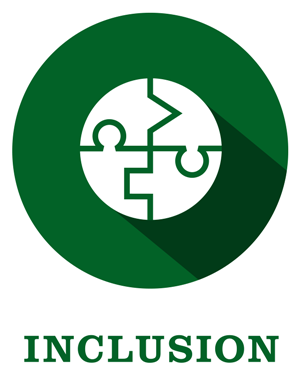- Strategic Plan
Building Cultural Competency Throughout Our Community

Overlake historians may recall that our current Coming Together Strategic Plan was initially planned to launch in the spring of 2020. Overlake spent the first week of March preparing to shift online during the COVID-19 pandemic, and the Strategic Plan was briefly shelved to focus on living in our new reality. With the murder of George Floyd in May of 2020, the national conversation on racism in America was ignited anew. Like many institutions, anti-racism work became a top priority for Overlake. Thanks to the hard work of our DEI Office, Overlake already had the DEI pillar of the Strategic Plan to advance the work of equity and inclusion, so it was launched first in the fall of 2020, with the other three pillars launching in the spring of 2021. The DEI pillar of our strategic plan calls for us to integrate cultural competency (see Overlake definition) throughout our community: with our student body through admissions protocols and in classroom and co-curricular work; with our employees through our hiring, retention, training, and evaluation processes; in our parent community through committees, DEI leadership, and training; and in the school leadership teams through professional development for the administration and Board of Trustees.
Significant work has been accomplished on this pillar to date. We have increased staffing in the DEI Office by adding an associate Director of DEI and a DEI curriculum coordinator. The school has also launched and/or bolstered significant programming around cultural competency curriculum through our DEJI program and affinity programming across 15+ affinities. Our Admissions team has also done is engaged in rethinking the process to admit, accept, and yield students at Overlake and building relationships with more local schools to support our admissions pipeline. Driven by the DEI pillar, we also launched our first three Strategic Plan Data Dashboards that include student and employee demographics, as well as employee retention.
This year, we are focusing on hiring and retention of employees, specifically in growing the culturally competent employees as well as increasing ethno-racial representation of underrepresented faculty and staff. We are also doing more work to define how we assess socioeconomic diversity at Overlake and what actions we will take to increase economic diversity. We know it’s a privilege to attend Overlake, and it is mission-aligned for us to provide greater access of an Overlake education to more students. Our current capital campaign, Doors to Discovery, directly supports this work by growing our financial aid endowment to ensure current and future students’ financial needs may be fully met.
As we consider the diversity of our employee body alongside our student body, we know that Overlake has grown increasingly diverse over the last few decades. At the time of publishing, 72% of our students identify as a race other than white or decline to answer. Faculty and staff of color represent about 30% of our employees. Our Strategic Plan Employee Demographic Dashboards have helped us to do a better job of quantifying these data and informing our decisions by integrating this information into our processes. We are currently working on a new admissions dashboard that will allow us to better understand our admissions pipeline, from inquiries to applicants to accepted students, and those who stay a short period at Overlake, or long period through graduation. Adding filters against race, socioeconomic status, gender identity, geographic location, etc., will allow us to understand better how Overlake can increase the diversity of our community to offer the Overlake experience to a broader swath of both students and employees.
We must also recognize the current societal context we exist in. We know that many states are increasingly passing laws affecting transgender students and gender-affirming care; we know that the racial reckoning ignited by George Floyd’s murder in June 2020 continues to build unrest, and we know that teaching about identity, anti-racism, and justice have become increasingly controversial in the national discourse with the popularization and polarization of “Critical Race Theory” or CRT. We remain committed to this work and firmly believe, as part of our values, mission, and vision, that building a diverse school that builds belonging and inclusion for all members builds a stronger community for past, current, and future Overlakers to be part of.
The DEI strategic plan pillar is led by Overlake's Director of Diversity & Inclusion, Mahtab Mahmoodzadeh
